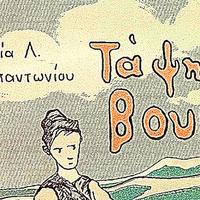69. Η θύελλα στις καλύβες των παιδιών
Πώς πέρασε ο χαλασμός! Σαν να μην είχε γίνει τίποτα. Πάλι ο ήλιος έλαμψε το δειλινό κι από τη γη έβγαινε μια ευωδιά.
Τα παιδιά γυρίζουν πίσω και στον δρόμο μιλούν για τη θύελλα. Εκείνη τους έριχνε νερό από τα παράθυρα κι αυτά την έβλεπαν αδιάφορα αν βρέχονταν κι αν κρύωναν. Είναι βρεγμένα τα φορέματά τους· μα τι είδαν! Μόνο για τη θύελλα άξιζε να πάνε στο βουνό.
Τι να γίνονται οι καλύβες; Τι να έγιναν τα παιδιά που άφησαν εκεί; Ο Κωστάκης, ο Γιώργος, ο Σπύρος, ο Καλογιάννης, ο Φουντούλης; Πόσο τα συλλογίστηκαν όταν έπεφτε η μπόρα!
Κατεβαίνουν γρήγορα. Στον δρόμο κοιτάζουν τη γη. Μόλις ήταν υγρή· είχε πιει όλο το νερό κι ήταν διψασμένη.
---
Άμα αντίκρισαν τις κατοικίες τους, φώναξαν αμέσως για ν' ακουστούν. Τα πέντε παιδιά, που είχαν μείνει εκεί, βγήκαν το ένα ύστερα από τ' άλλο. Ήταν σωστά, οι καλύβες όμως όχι.
Τρεις καλύβες ήταν γκρεμισμένες και σκόρπιες. Το νερό συνεπήρε τα κλαδιά τους μαζί με πολλά πράματα που ήταν μέσα.
Πήρε μερικά σκεπάσματα, το ράφι, δύο τενεκέδες και δύο καρβέλια ψωμί. Το κουτί του Σπύρου ούτε η θύελλα το πήρε.
Ο Σπύρος όμως το πήρε και πέταξε μόνος του όλες τις σκουριές που είχε μέσα. Από την ώρα που βρήκε την πέτρα συλλογίζεται να μην ξαναμαζέψει πράματα που δε χρειάζονται.
—Και σεις πού κρυφτήκατε; ρώτησε ο Μαθιός.
—Μας έπιασε όλους μαζί εδώ μέσα, απάντησαν. Φράξαμε την πόρτα μ' ένα στρώμα και το κρατούσαμε ώρα πολλή με δύναμη. Η καλύβα όμως δεν έσταξε καθόλου κι έτσι γλιτώσαμε...
Οι λοτόμοι, όταν έστηναν τις καλύβες, είχαν φροντίσει ακόμα και για τις μπόρες. Μια καλύβα, τη μεγαλύτερη, τη σκέπασαν με χράμι, υφασμένο από τραγίσιο μαλλί· αυτό δεν το περνά τίποτα.
---
Το βράδυ, από έναν χωριάτη που πέρασε και πήγαινε στην Πέτρα, έμαθαν πως η θύελλα πιο κάτω έκανε καταστροφή. Πάει το Πουρνάρι!
Μεγάλη νεροποντή, που ήρθε από τις ράχες, έπνιξε τα καλαμπόκια, τα καπνά και τα τριφύλλια του. Το νερό, που κατέβασε ο χείμαρρος, έσπασε ένα γεφύρι και από ‘κεί όρμησε μέσα στο χωριό. Έπεσαν σπίτια στο Πουρνάρι, πνίγηκαν γίδια και πρόβατα, ακόμα κι αγελάδες. Λένε πως τρεις Πουρναρίτες, εκεί που πάλευαν να γλιτώσουν τα σπίτια τους, τους πήρε το νερό.
Ακούγοντας αυτή την καταστροφή, τα παιδιά έμειναν αμίλητα και λυπημένα. Ο χωριάτης όμως κούνησε το κεφάλι του και είπε για τους Πουρναρίτες:
—Αφού δεν άφησαν ρίζα ξερή στις ράχες, ποιος τους έφταιξε; Οι ίδιοι το 'φεραν το νερό που τους έπνιξε.

